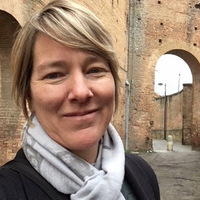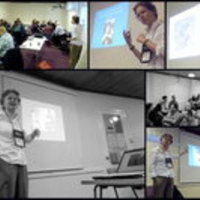
Lisa Loutzenheiser
My research interests are focused on the educational experiences of marginalized youth. This focus emanates from my teaching experience and research on youth in alternative educational settings. I combine a fascination with curriculum, queer /gender, and poststructural theories, as well as the intersections of race, gender, sexuality, etc. in schooling to look at the experiences of marginalized youth. Currently, she is working on research with youth in foster care.
A second strand of her research flows from the statements of youth in alternative settings suggesting that they learn best when strong connections are made with teachers and with their own lives/identities. Therefore, I am also interested in exploring how sometimes difficult and controversial issues such as heteronormativity, and racism can be brought into both K-12 (particularly social studies) and teacher education courses. An outgrowth of this interest is a research project on the use of cultural school autobiographies in teacher education.
Dr. Loutzenheiser also delves into the ethical conundrums of qualitative research methodologies and enjoys playing with technology which has led to the use and teaching of video ethnography.
A second strand of her research flows from the statements of youth in alternative settings suggesting that they learn best when strong connections are made with teachers and with their own lives/identities. Therefore, I am also interested in exploring how sometimes difficult and controversial issues such as heteronormativity, and racism can be brought into both K-12 (particularly social studies) and teacher education courses. An outgrowth of this interest is a research project on the use of cultural school autobiographies in teacher education.
Dr. Loutzenheiser also delves into the ethical conundrums of qualitative research methodologies and enjoys playing with technology which has led to the use and teaching of video ethnography.
less
Related Authors
Jen M R Self
University of Washington
José M . Aguilar-Hernández
Cal Poly Pomona
Alexandre Baril
University of Ottawa | Université d'Ottawa
Cindy Holmes
University of Victoria
Rodrigo Borba
Universidade Federal do Rio de Janeiro (UFRJ)
Vicky Gunn
The Glasgow School of Art
InterestsView All (28)






Uploads
Papers by Lisa Loutzenheiser
workings of the settler colonial state that are simultaneously anti-Black, anti-Indigenous, antiimmigrant, antitransgender, antiqueer, antipoor, and also antidisability. And yet, notwithstanding its pivotal location, educational studies scholarship continues to enable the erasure and invisibility of disability in discussions of transformative educational praxis. The authors of the articles in this special issue break with this tradition and, instead, offer diverse and compelling analyses that critically engage disability at the intersections of race, sexuality, immigration/refugee, gender, class, and gender identity. The guest editors discuss the critiques and possibilities that enable/disenable
critical disabilities studies at the intersections and enmeshments of social difference. The introduction describes how the articles included in this special issue explicate the problematic: What’s disability got to do with educational studies? Drawing on Robert McRuer’s (2006) conceptualization of “cripping" as a paradoxical and transgressive act of talking back to discourses of compulsory normativity, the guest editors hope this special issue encourages readers to continue the critical
work of crippin’ educational studies.
workings of the settler colonial state that are simultaneously anti-Black, anti-Indigenous, antiimmigrant, antitransgender, antiqueer, antipoor, and also antidisability. And yet, notwithstanding its pivotal location, educational studies scholarship continues to enable the erasure and invisibility of disability in discussions of transformative educational praxis. The authors of the articles in this special issue break with this tradition and, instead, offer diverse and compelling analyses that critically engage disability at the intersections of race, sexuality, immigration/refugee, gender, class, and gender identity. The guest editors discuss the critiques and possibilities that enable/disenable
critical disabilities studies at the intersections and enmeshments of social difference. The introduction describes how the articles included in this special issue explicate the problematic: What’s disability got to do with educational studies? Drawing on Robert McRuer’s (2006) conceptualization of “cripping" as a paradoxical and transgressive act of talking back to discourses of compulsory normativity, the guest editors hope this special issue encourages readers to continue the critical
work of crippin’ educational studies.